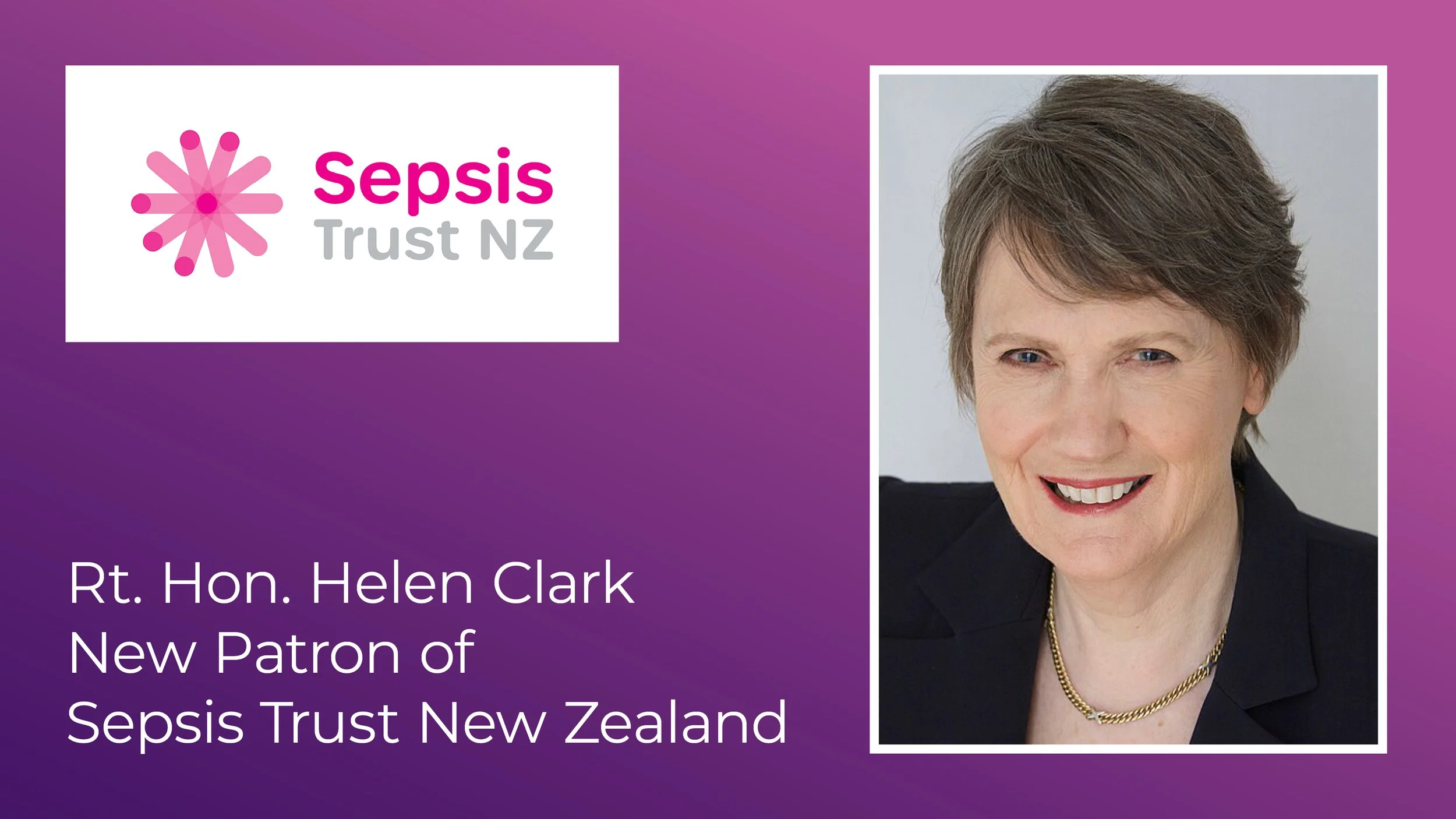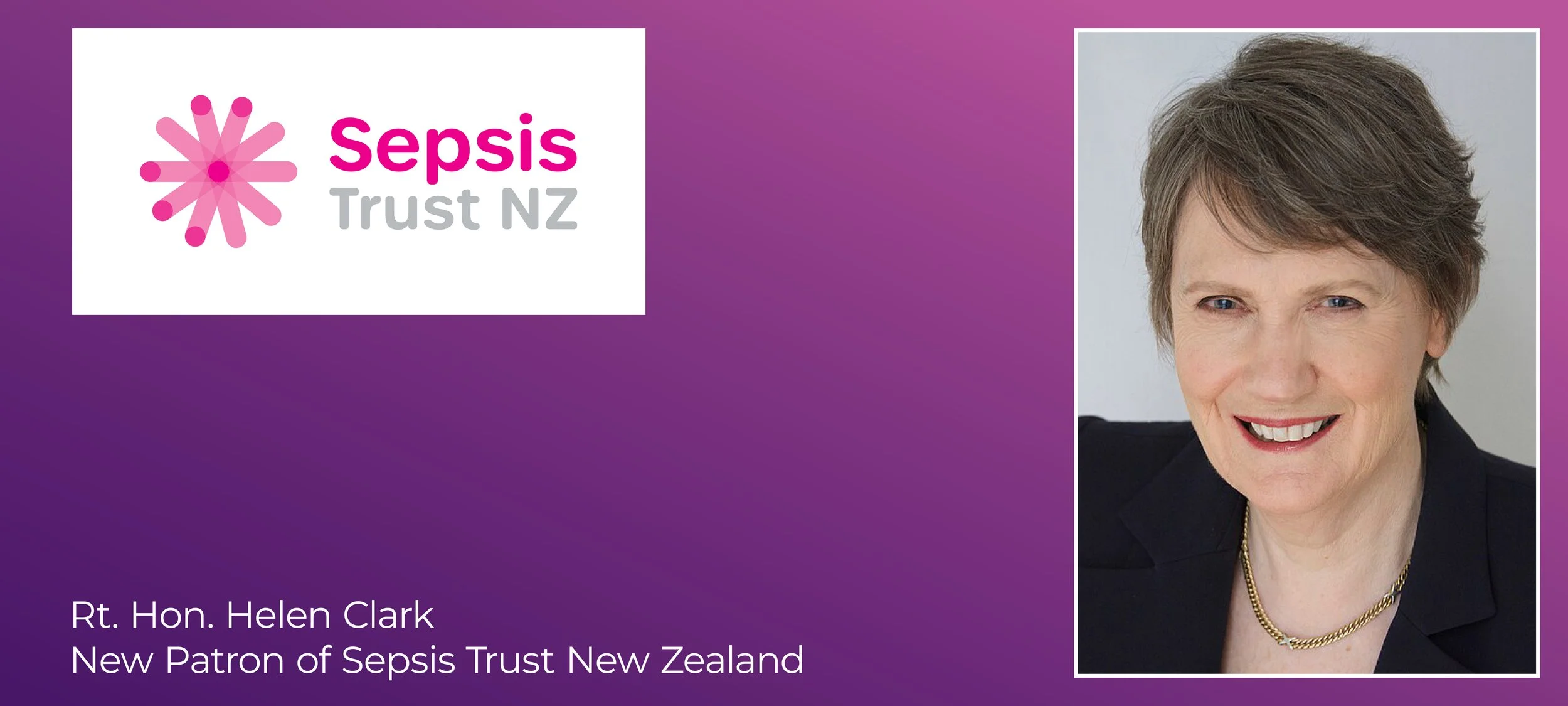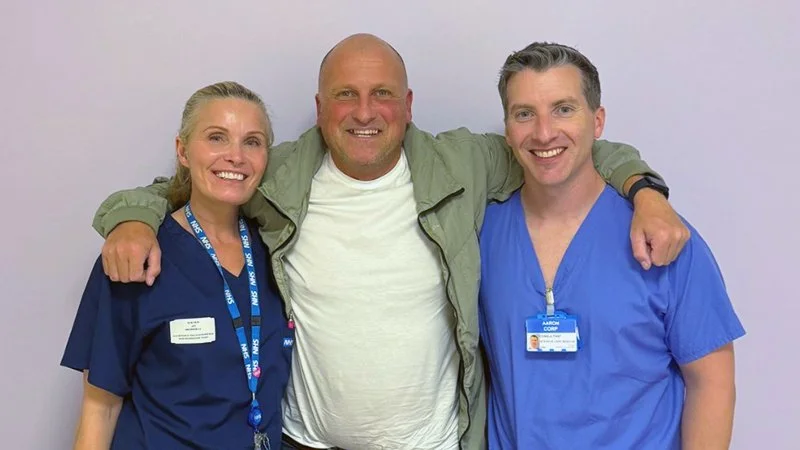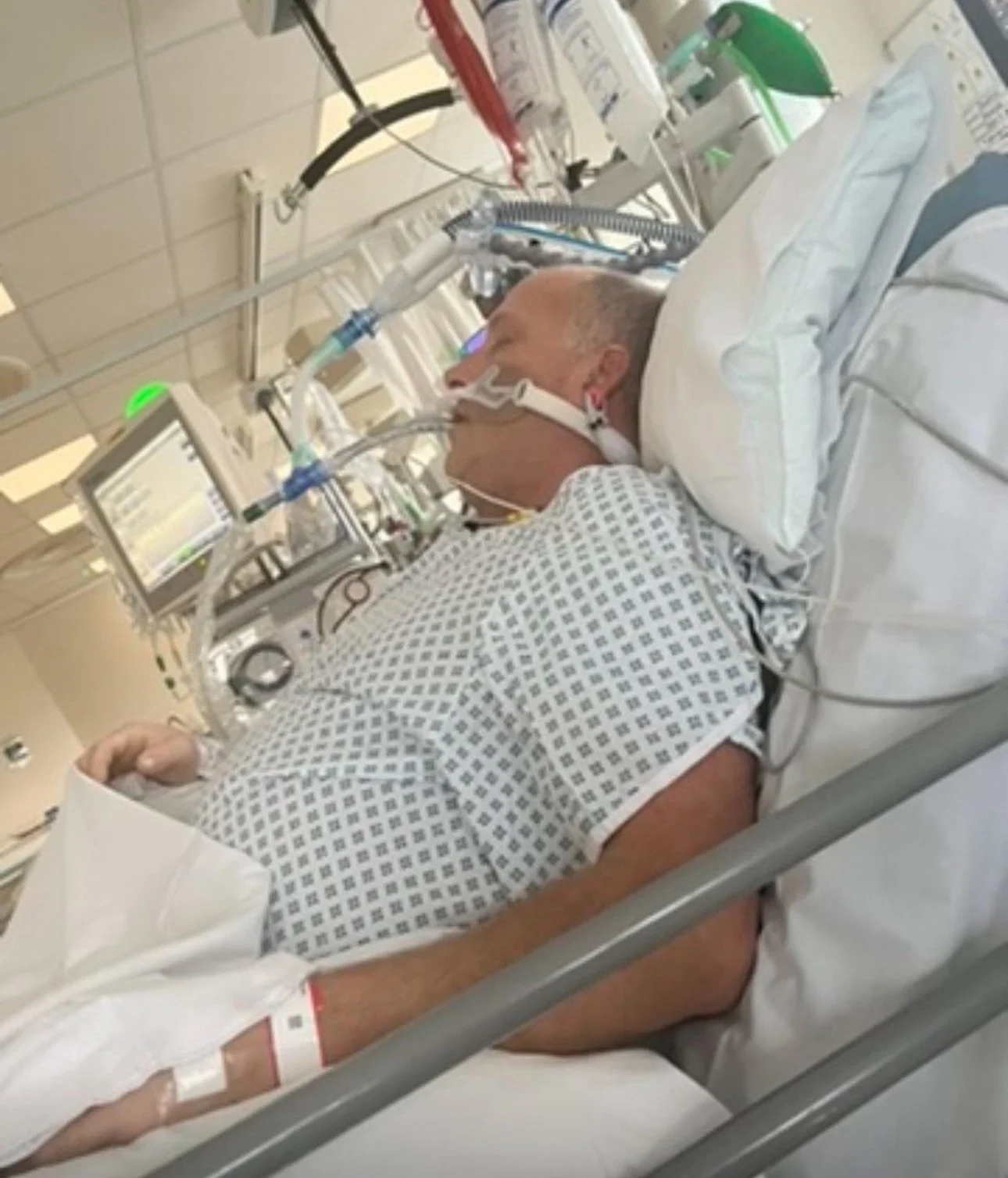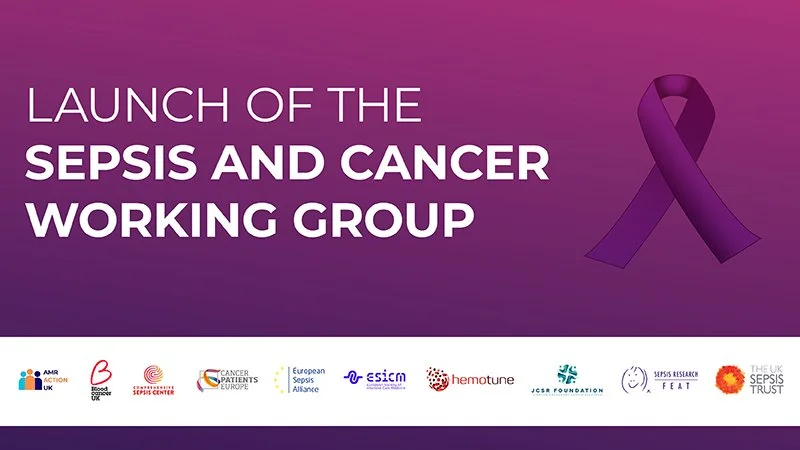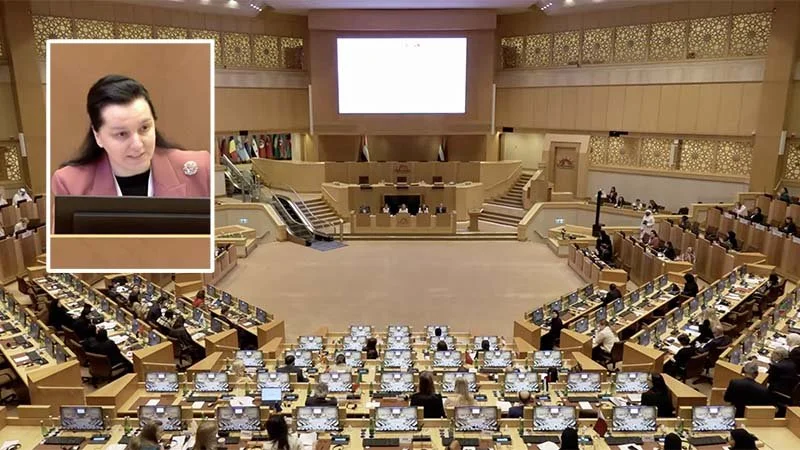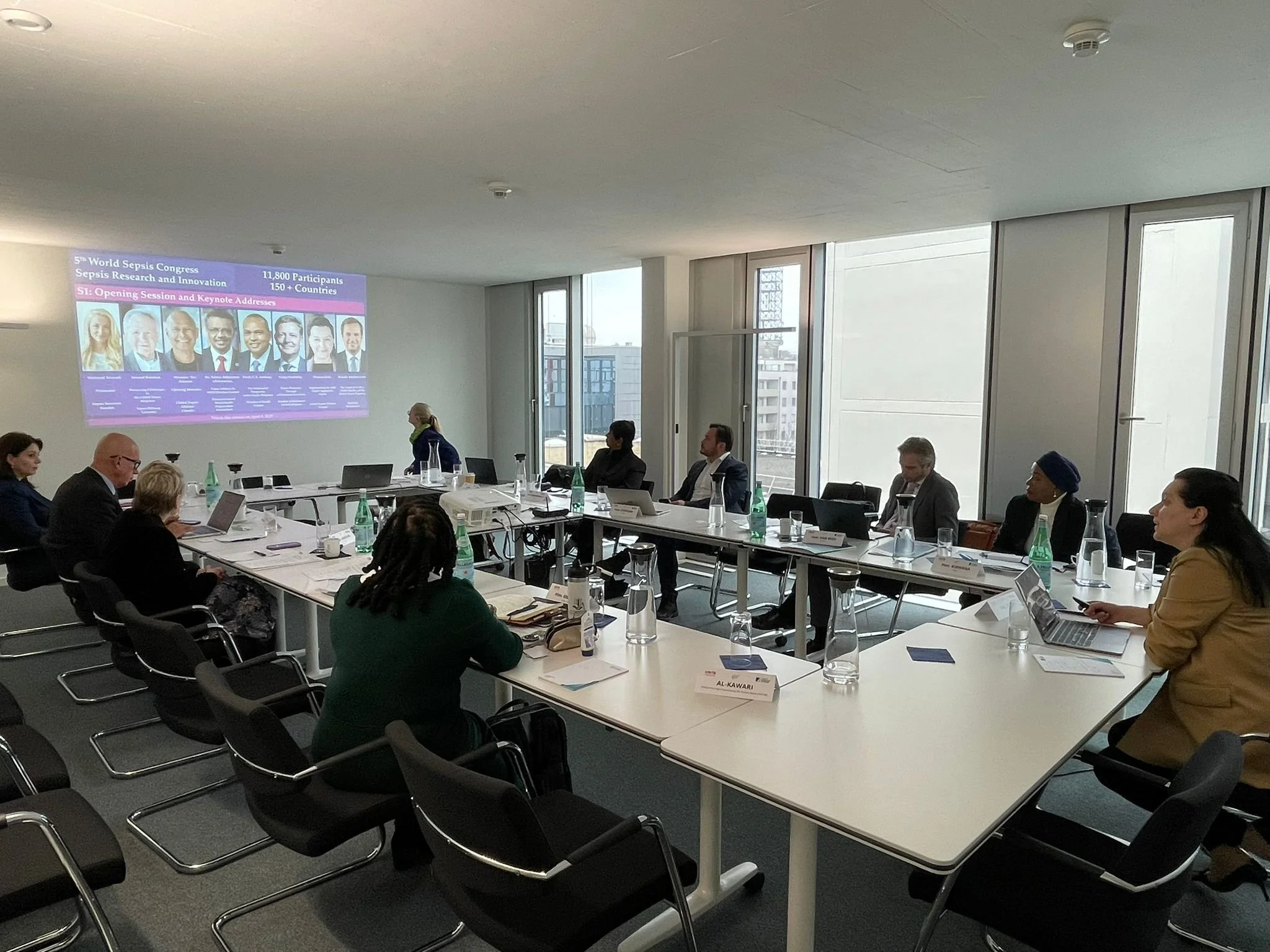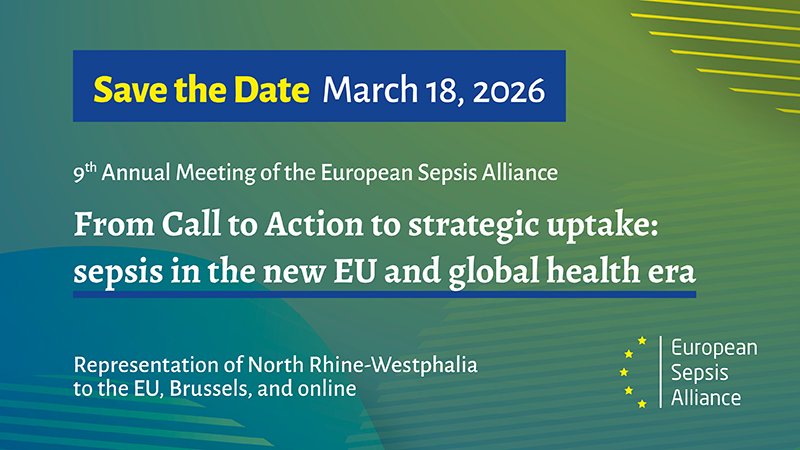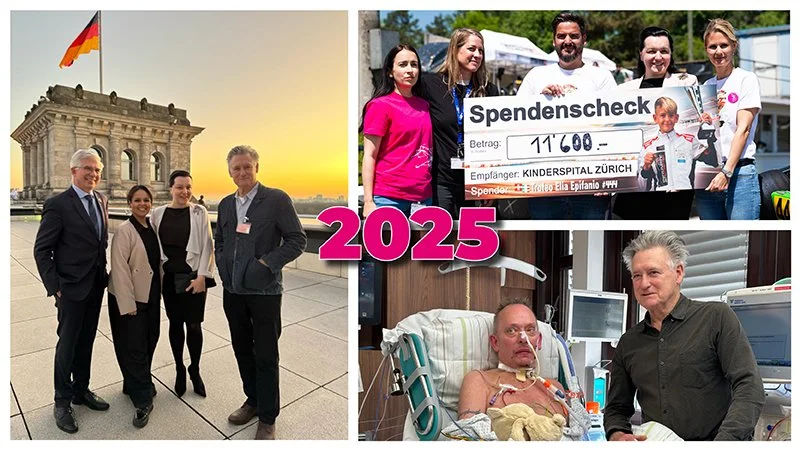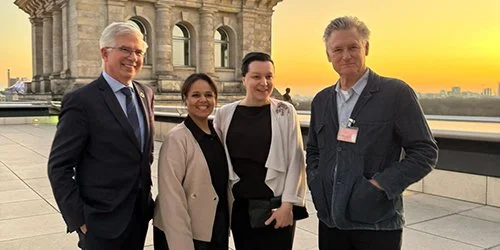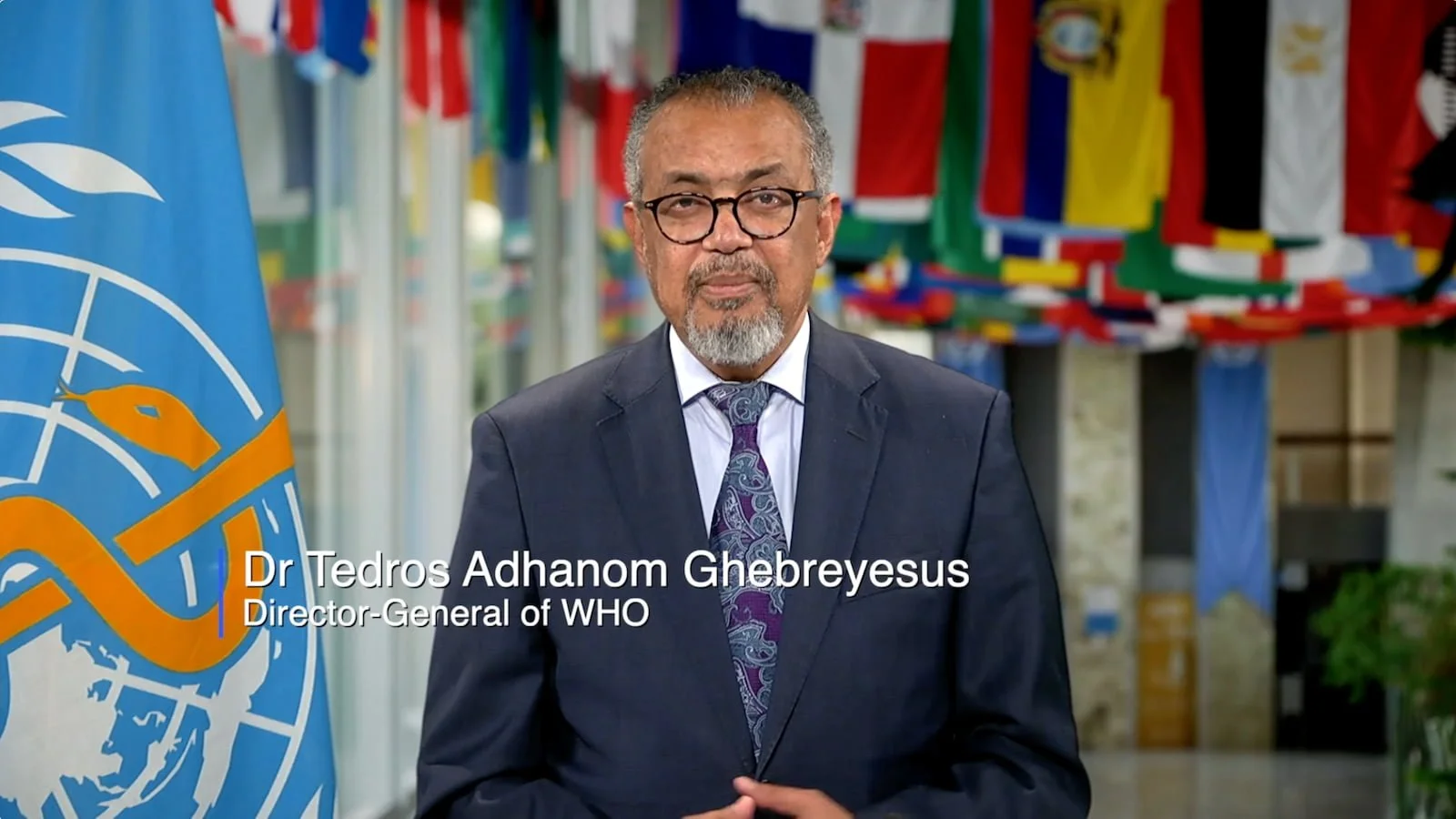GSA is excited to share the announcement that former Prime Minister of New Zealand, the Rt. Hon. Helen Clark, is the new Patron of Sepsis Trust New Zealand.
Her appointment brings an unparalleled depth of global leadership and public health experience to the role, signalling to government, clinicians, funders and the public that sepsis is a serious, system-level health priority worthy of national and international attention.
As former Prime Minister of New Zealand, Administrator of the United Nations Development Programme (UNDP), and Co-Chair of the Independent Panel for Pandemic Preparedness and Response, Helen Clark has spent decades advancing health equity, strengthening health systems, and championing prevention and early intervention worldwide.
As Patron, Helen Clark will bring her voice, credibility and global perspective to Sepsis Trust New Zealand’s mission to reduce the impact and burden of sepsis across Aotearoa, supporting earlier recognition, better treatment, and improved outcomes for patients and whānau.
Sepsis remains a leading cause of preventable harm and death, yet it is still too often misunderstood or misdiagnosed. This patronage will strengthens our ability to raise awareness, influence policy, and work alongside clinicians, communities and decision-makers as we strive to have sepsis recognised as a global health priority.
In early November 2024, I had been feeling unwell for a few days. I had a fever, I was being sick, and I had diarrhoea. I honestly thought I had picked up a bug. On Tuesday morning, I rang in sick at work and went to see my doctor. He told me there was a viral infection going around and that I just needed to rest.
That evening, everything changed.
I woke up around 11 pm and could see people at my car. I thought they were trying to steal it, so I rang the police. When they arrived, nobody was there. About ten minutes later, I rang again because I could see them back at my car. This happened a few times. On the third call, the officers were going to arrest me for wasting police time, but one of them noticed I looked seriously unwell. I was hallucinating. Sepsis delirium had already set in. Those officers didn’t realise it at the time, but they saved my life. All I remember after that is walking towards the ambulance.
Hospital
I arrived at the hospital in the early hours of Wednesday, 13th November. I was in triage and had blood tests taken. I was told my sodium was dangerously low, my potassium was high, and my blood pressure was very low. I became unresponsive, and they put a tube down my throat to help me breathe.
I then suffered my first cardiac arrest. I was transferred to the ICU, where I suffered another cardiac arrest that lasted around eight to ten minutes. CPR was performed, and adrenaline was given to restart my heart.
My kidneys had stopped working, so I was put on dialysis. I was ventilated and heavily sedated. Very quickly, I went into multi-organ failure – neurological, renal, hepatic, and cardiovascular. The doctors and consultants didn’t know what had caused it. They inserted multiple arterial lines and started treating me for sepsis with strong antibiotics, but the source of infection was never found. Within about 12 hours of being admitted, my whole family was called in and told how critical my condition was.
The Worst Days
For the next day or so, my family stayed by my bedside waiting for me to die. On Friday, 15th November, the consultants spoke to my family about a Do Not Resuscitate (DNR) order. They explained I was too poorly to survive another cardiac arrest and that it would be inhumane to attempt CPR again. That same day, I had to be taken for a CT scan so doctors could try to find the source of the infection. My family was warned there was a real chance I might not survive the journey, because I was so unstable and would need to be disconnected from some of my life support to go. About an hour later, doctors and nurses wheeled me back into the ICU. I had made it through. After that, my blood results slowly started to show small signs of improvement.
ICU and Recovery
I was kept sedated for most of the next 23 days. I was only woken twice because I was still too unstable.
During my time in the ICU:
I was treated for sepsis with antibiotics
I remained on dialysis
I needed medications to keep my blood pressure up
I experienced ICU delirium
I had a tracheostomy
I lost around 3½ stone
Doctors later told me I was an enigma and nothing short of a miracle. I spent six weeks in total in the hospital. On the 18th of December, my dad wheeled me out because I was too weak to walk.
Life After
When I woke up, I had no memory of what had happened. I suffered memory loss, confusion, anxiety, and recurring nightmares. I needed physiotherapy and cognitive therapy because my brain wasn’t working properly at first. I have now finished both. All my organs are back to normal.
I’ve been back to the ICU at Royal Calderdale several times to thank the incredible doctors and nurses who saved my life. I’ve become good friends with a couple of the ICU nurses, and I will never forget the care I received there.
I’ve also been to the police station to personally thank the officers who noticed I was unwell that night. If it wasn’t for them, I would have died at home on my own. Doctors say I’m nothing short of a miracle.
I’d also like to thank the team at World Sepsis Day and the Global Sepsis Alliance for allowing me to share my journey. I hope my story raises awareness of the symptoms people need to look out for, confusion, being sick, diarrhoea, and feeling generally unwell. These signs can easily be missed, and people can deteriorate frighteningly fast.
I’m a dad to three girls, and I am a very grateful man today.
Justin Chancellor
The article above was written by Justin Chancellor and is shared here with his explicit consent. The views in the article do not necessarily represent those of the Global Sepsis Alliance. They are not intended or implied to be a substitute for professional medical advice. The whole team here at the Global Sepsis Alliance and World Sepsis Day wishes to thank him for sharing her story and for fighting to raise awareness for sepsis.
On the occasion of World Cancer Day, the European Sepsis Alliance, together with leading professional societies, research institutions, and industry partners, is pleased to announce the launch of a new Working Group on Sepsis and Cancer.
This initiative has been convened following the leadership and impetus of The Jibraan Chaudhary Sepsis Research Foundation, whose mission highlights the urgent and often overlooked intersection between cancer, immunosuppression, and sepsis.
Why sepsis and cancer?
Sepsis remains one of the most serious and underestimated complications affecting people living with cancer. Patients undergoing chemotherapy—particularly those experiencing neutropenia—are at increased risk of infection, rapid deterioration, and recurrent sepsis episodes.
Neutropenic patients are several times more likely to develop sepsis than the general population, with infections often progressing rapidly and atypically.
Sepsis is a leading cause of unplanned hospitalisation and ICU admission among patients with haematological malignancies.
Cancer survivors who experience one episode of sepsis face a significantly higher risk of recurrence, long-term morbidity, treatment interruptions, and mortality.
Despite advances in oncology, infection prevention and sepsis management have not kept pace, often falling between medical specialties and health system responsibilities.
As cancer survival improves, addressing sepsis prevention, early recognition, and optimal management must become a core pillar of cancer care, rather than a reactive response to complications.
Purpose of the Working Group
The Working Group on Sepsis and Cancer aims to bring together expertise across disciplines to:
Elevate awareness of sepsis as a major, preventable threat to cancer patients
Identify gaps in clinical pathways, research, and policy related to infection and sepsis in oncology and haematology
Promote better integration of sepsis prevention, early detection, and response within cancer care pathways
Support research, data generation, and advocacy efforts that improve outcomes for immunocompromised patients
The Working Group will serve as a collaborative platform, connecting clinicians, researchers, patient advocates, policymakers, and industry to identify shared solutions at national and European levels.
Founding organisations
The Working Group is founded by the following organisations:
An open and growing initiative
The Working Group is open to additional organisations—including patient groups, professional societies, academic institutions, and business partners—who share an interest in addressing this critical and under-recognised aspect of cancer care. Should you be interested in joining the working group, please contact Simone Mancini at Simone.Mancini@global-sepsis-alliance.org or Nveed Chaudhary at Nveed@jcsr.org.uk.
As the Working Group develops its priorities, workplan, and activities, we will share updates on progress, outputs, and opportunities for engagement.
Hon. Dr. Mariam Jashi Champions Women’s Leadership at the 2nd Women Parliamentary Forum of the Parliamentary Assembly of the Mediterranean (PAM) in Abu Dhabi
From January 26–28, 2026, Hon. Dr. Mariam Jashi, UNITE Chapter Chair for Eastern Europe & Central Asia, represented UNITE at the 2nd Session of the Parliamentary Assembly of the Mediterranean (PAM) Women Parliamentary Forum (WPF), held under the high patronage of Her Highness Sheikha Fatima bint Mubarak, Supreme Chairwoman of the Family Development Foundation and President of the General Women’s Union. The Forum, themed “Empowering Women for Cohesive and Inclusive Societies: From the Gulf to the Mediterranean”, convened women parliamentarians, policymakers, and civil society leaders from across the region to explore strategies for advancing women’s empowerment in politics, economics, education, health, and peacebuilding.
Driving Women’s Political and Economic Leadership
Hon. Dr. Jashi delivered a speech in the session “Advancing Women in Economic and Political Life”, where she shared her insights on how regional and international parliamentary networks can effectively amplify women’s participation in governance. Dr. Jashi highlighted the essential role parliamentarians play in representing their constituencies, passing laws and budgets, and holding governments accountable. Drawing on evidence linking political participation to greater freedom and equity, Dr. Jashi underscored persistent gender inequalities, including barriers to healthcare access for women living in poverty and the underrepresentation of women in leadership despite their dominance in the health workforce. She called for stronger political engagement and partnerships to advance women’s political participation and invited delegates to join UNITE and its upcoming Global Summit in Manila on March 7–8.
The Forum highlighted the importance of integrating economic empowerment with political engagement. Discussions emphasized that women cannot fully participate in public life without access to financial independence, social protection, and equal opportunities in the workforce. Policies that address gendered barriers to employment, access to finance, and entrepreneurship were recognized as having a multiplier effect, enabling women to contribute more meaningfully to policy-making, leadership, and community resilience.
The sessions also underscored the intersectionality of women’s challenges, noting that cultural, economic, and social factors affect women differently depending on age, region, or social status. Participants stressed the need for tailored policy solutions and cross-national collaboration, encouraging parliamentarians to develop legislation informed by local realities while drawing on international best practices
Promoting Holistic Women’s Empowerment
Beyond the political and economic focus, Hon. Dr. Jashi engaged with discussions on health, education, and environmental sustainability, highlighting how empowering women in these sectors strengthens entire societies. She stressed the need for integrated approaches: improving women’s access to healthcare and education directly influences their economic participation and capacity for civic leadership, creating a virtuous cycle of empowerment.
Advancing UNITE’s Mission Through Regional Collaboration
Hon. Dr. Jashi’s participation reinforced UNITE’s commitment to strengthening the role of women in decision-making and sustainable development. By engaging with regional partners and sharing best practices, she helped highlight actionable solutions for increasing women’s political representation, promoting gender-responsive policymaking, and leveraging parliamentary networks to achieve tangible impact.
The Forum concluded with a forward-looking dialogue on how women’s parliamentary networks can inspire change in times of fragmentation, aligning closely with UNITE’s mission to cultivate leadership, collaboration, and innovation among women lawmakers worldwide.
Dr. Mariam Jashi, CEO of the Global Sepsis Alliance, Board Member of the UNITE Parliamentarians Network, and Secretary General of the Medical Women’s International Association, participated in the KAS–UNITE Parliamentarian Dialogue Program on Women’s Health held in Geneva on January 20–21. The high-level dialogue brought together parliamentarians and senior representatives of the UN and global health institutions to address pressing challenges in women’s health and strengthen political leadership for gender-responsive health systems.
During meetings at the World Health Organization (WHO), UN Women, the United Nations Population Fund (UNFPA), and UNITAID, discussions focused on gender equity, sexual and reproductive health and rights, non-communicable diseases, and innovation in global health financing. Parliamentarians also engaged with the Office of the United Nations High Commissioner for Human Rights on women’s rights within the UN human rights system, as well as with Médecins Sans Frontières on health challenges in conflict and humanitarian settings.
The dialogue included a special presentation delivered by Dr. Mariam Jashi on “Sepsis and Women,” addressing gender-specific dimensions of Sepsis, disparities in early recognition and treatment, and the urgent need for stronger political and health system responses. Drawing on her experience as a former parliamentarian and global health leader, Dr. Jashi emphasized the critical role of policymakers in prioritizing Sepsis within national health agendas and ensuring equitable access to timely diagnosis and care for women and girls. Her contribution reinforced the importance of integrating Sepsis into broader discussions on women’s health, antimicrobial resistance, and resilient health systems. The presentation resulted in expressions of interest from parliamentarians to be more actively engaged in Sepsis-related advocacy to save lives, including through the World Sepsis Congress and World Sepsis Day movements.
In addition to multilateral engagements, the dialogue also featured public–private discussions on global health priorities, fostering exchange between parliamentarians and key global health agencies and partnerships. These discussions engaged the International Federation of Pharmaceutical Manufacturers and Associations (IFPMA), Medicines for Malaria Venture, GSK, United Robotics Group Health & Food GmbH, Siemens Healthineers, Global Antibiotic Research and Development Partnership (GARD-P) and Drugs for Neglected Diseases initiative (DNDi), highlighting the importance of collaboration across sectors to strengthen resilient and equitable health systems.
UNITE Parliamentary Delegation included:
· Hon. Dr. Éctor Jaime Ramírez Barba – Member of Parliament, Mexico
· Hon. Sascha van Beek – Member of the German Bundestag
· Hon. Dr. Sudarshini Fernandopulle – Former Member of Parliament, Sri Lanka
· Hon. Hamida Ali Kibwana – Member of Parliament, Kenya
· Hon. Daniel Molokele – Member of Parliament, Zimbabwe
· Hon. Prof. Nomafrench Mbombo – Member of Parliament, South Africa
· Hon. Dr. Orjola Pampuri – Former Member of Parliament, Albania
· Hon. Penilla Gunther – Former Member of Parliament, Sweden,
· Hon. Dr. Peter Stachura – Member of Parliament, Slovakia
This visit was kindly supported by the Konrad-Adenauer-Stiftung. The UNITE Parliamentarians Network and the Global Sepsis Alliance express their sincere appreciation to Andrea E. Ostheimer, KAS Representative to the United Nations Geneva, and Sarah Ultes, Research Associate at KAS Multilateral Dialogue Geneva, for their excellent coordination, substantive support, and strong partnership in making this Parliamentary Dialogue possible.
My sepsis story began earlier this year, more precisely on May 13, 2025.
Normally, very little can truly throw me off balance anymore. But what happened then was unlike anything I had ever known or experienced before.
Because I was born with spina bifida, I have been familiar with hospitals and their routines since childhood. That is why I initially didn’t think something could seriously surprise me so quickly.
On May 13, I had an appointment with my gynecologist for my annual check-up. For several days beforehand, I had been suffering from severe menstrual pain, and as a result, I was prescribed the pill.
However, since the pain in my abdomen and lower pelvic area did not subside, I visited my general practitioner. There, a bladder infection was diagnosed and treated.
By May 19, I still wasn’t feeling any better. During another visit to my GP, blood was drawn, and a comprehensive blood test was ordered. I was also given an infusion because I was dehydrated.
That same evening, my GP called me. She explained that my inflammatory markers were extremely high and that I needed to go to the hospital immediately. I was told to pack a few things and go straight to the emergency department.
My father took me to Freiburg University Hospital at around 5 p.m. There, I received immediate medical care. By that time, I was already in such severe pain that I could barely process what was happening around me.
In the resuscitation room, I was examined by a team of doctors and nurses. The diagnosis: urosepsis, which had already triggered organ failure. In addition, a kidney stone was discovered in my left kidney. Since my right kidney had already been damaged due to a severe kidney infection in childhood, my left kidney was now also affected.
My condition was critical: blood pressure of 75/55, severe chills, and recurring fever spikes. Immediate removal of the kidney stones was not possible. The doctors, therefore, decided to insert a ureteral stent as an initial measure. This procedure was performed during the night at around 3 a.m., after my circulation had been stabilized to some extent.
In total, I stayed in the hospital for one week: two to three days in the intensive care unit, followed by time on a general ward.
Today I know this: only because of the quick actions of my GP, the medical team, and my family am I still alive. The doctors later told me that without being admitted to the hospital, I probably would not have survived the next day.
From this experience, I take away one thing above all: gratitude. Gratitude for my family, especially my parents, who reacted immediately, and my father, who took me to the hospital. Gratitude for my partner, who stood by my side. And gratitude for life, which gave me a second chance.
The article above was written by Hanna and is shared here with his explicit consent. The views in the article do not necessarily represent those of the Global Sepsis Alliance. They are not intended or implied to be a substitute for professional medical advice. The whole team here at the Global Sepsis Alliance and World Sepsis Day wishes to thank her for sharing her story and for fighting to raise awareness for sepsis.
We are delighted to begin the new year with the announcement that the 9th ESA Annual Meeting will take place on 18 March in Brussels, at the Representation of North Rhine-Westphalia to the EU.
At the last Annual Meeting in March, we launched the Call to Action for Sepsis in Europe, which set out concrete recommendations for EU institutions, Member States, and stakeholders.
One year on, the 2026 meeting aims to take stock of progress, identify gaps, and reinvigorate the commitments outlined in the Call to Action. We will involve European policymakers and authorities, sepsis survivors and experts, with the objective to demonstrate the urgency to integrate sepsis into the EU policy agenda and engage participants in advocating for sepsis awareness and prioritisation.
As speakers are still confirming their participation, the programme will be published soon. Meanwhile, please save the date and register to attend the event online or in person.
Sponsors
NB: Sponsors do not influence in any way the content of the event.
As we rapidly approach the close of 2025, we reflect with immense gratitude on a year defined by collaboration, innovation, and expanding community engagement in the fight against sepsis. From our flagship World Sepsis Congress and major technical consensus publications to new initiatives bringing sepsis survivors and global advocates into the heart of decision-making, this year was marked by remarkable achievements made possible by our over 120 member organizations, Regional Sepsis Alliances, partners, survivors, and supporters around the world.
Together, we continued to elevate sepsis on the health agenda, fuel momentum behind the 2030 Global Agenda for Sepsis, and expand opportunities for meaningful action at every level of society.
Reflecting on 2025
January / February / March
The year began with the release of the final version of the 2024 WSD Event Poster, followed shortly by an online roundtable on global perspectives on sepsis diagnostics and management, hosted by SelectScience, and Dulce sharing her sepsis story and calling for greater awareness in Mexico.
After opening the registrations for the 8th Annual Meeting of the European Sepsis Alliance and the 5th World Sepsis Congress in January, we hosted a WSC Satellite Session on the metabolism of sepsis in February – you can watch it here. Also in February, our CEO, Dr. Mariam Jashi, urged the WHO Executive Board and governments worldwide to prioritize sepsis in Universal Health Coverage (UHC) packages at the 156th Session of the WHO EB in Geneva, Switzerland.
Later in February, Frontiers in Science published a policy outlook titled ‘Investing in sepsis science for future pandemic preparedness’, authored by Dr. Mariam Jashi and Prof. Niranjan ‘Tex’ Kissoon on behalf of the Global Sepsis Alliance.
In the last week of February, the GSA welcomed esteemed actor, filmmaker, and AMR Ambassador Bill Pullman to Berlin, culminating in the ‘Overcoming Silos by Synergizing the Fight Against Sepsis and AMR’ symposium at the Charité – Universitätsmedizin Berlin.
In early March, we shared Elia Epifanio’s sepsis story, announced a partnership with the International Fluid Academy (IFA), and reported on the inaugural meeting of the Global Sepsis Innovations Platform (GSIP).
On March 19, we came to you live from the European Parliament in Brussels for the 8th Annual Meeting of the ESA, where we launched a Call to Action for European policymakers – you can rewatch it here should you have missed it, and the full report from the event is available here.
Closing out the month, GSA’s President, Prof. Niranjan ‘Tex’ Kissoon, attended the STAIRS 2nd Annual Consortium Meeting in Ghana, and Marianne Haverkamp received the Sepsis Code Award for her efforts in awareness and prevention.
April
In April, the 5th World Sepsis Congress brought together almost 12,000 participants from over 170 countries for two days of high-level knowledge exchange on sepsis epidemiology, diagnostics, care pathways, and innovations in prevention and treatment. Hosted fully online and free of charge, this year’s Congress underscored the power of shared learning and global collaboration to drive progress.
Highlights included:
Sessions on artificial intelligence, integrated care, and antimicrobial stewardship
Expert panels giving voice to sepsis survivors and family members
Multi-stakeholder discussions on research priorities and health system strengthening
The congress was held entirely online, and participation was free of charge. The talks are still available for free on YouTube and as a podcast on Apple Podcasts – just search for ‘World Sepsis Congress’ in your favorite podcast player. Maybe you’ll make time to catch up on a talk or two during the holidays?
The congress itself was an amazing success yet again – 11,945 people from 174 countries signed up to participate, 68% from low- and middle-income countries. The full report is available here, including feedback from attendees and a ton of interesting numbers and stats.
But that wasn’t all – earlier in April, the GSA launched the Global Sepsis Survivor Committee (GSSC), hosted a high-level session at the ESCMID Global Symposium in Vienna, and shared Linda’s sepsis story.
Mariam also joined UNITE at the 2025 Global Parliamentary Forum in New York and bilateral meetings in Washington, D.C.
May
May began with the GSA’s support for World Hand Hygiene Day on May 5. Clean healthcare is one of the most pressing challenges identified by the United Nations to be addressed by the global community within the next decade. It holds significant relevance in achieving the Sustainable Development Goals (SDGs) and combating infections, sepsis, and, most notably in recent years, COVID-19.
Next, Mariam participated in the 38th Meeting of the Policy and Coordination Committee (PCC) of the UNDP/UNFPA/UNICEF/WHO/World Bank Special Programme of Research, Development and Research Training in Human Reproduction (HRP), held at WHO Headquarters in Geneva.
On May 10, Mariam joined the Trofeo Elia Epifanio – a charity racing event in Switzerland, held in memory of Elia Epifanio.
On May 24, through our strategic partnership with the Medical Women’s International Association and collaboration with the Governments of Guyana and Egypt, the UNITE Parliamentarians Network for Global Health, the Virchow Foundation, Sepsis Stiftung, and CHAI, we are proud to have convened the first Official Side Event on Sepsis at the 78th World Health Assembly (WHA) in Geneva.
At the 78th World Health Assembly (WHA), Dr. Mariam Jashi delivered two official statements, calling on WHO Member States and key global health players to prioritize sepsis as the leading cause of death and disability worldwide.
We also started to release the sessions from the 5th WSC – as mentioned above, they are still available on YouTube and as a podcast on Apple Podcasts, if you aren’t caught up yet.
June / July / August
June started with Wilbert’s sepsis story, the reintroduction of the SEPSIS ACT in the US Senate, and the publication of the aforementioned 5th WSC Report.
Later that month, GSA CEO, Dr. Mariam Jashi, and Partnership Lead, Simone Mancini, attended the H20 Summit, hosted by the G20 & G7 Health and Development Partnership at the World Health Organization headquarters in Geneva, under the guiding theme "Rebuilding Public Trust for Global Health – Coming Together for SDG30".
We also published our report from the 78th World Health Assembly Official Side Event on Sepsis and welcomed the newly elected Board for the 2025 to 2028 term.
Gearing up for World Sepsis Day, we published our annual collection of ideas, inspiration, and material for World Sepsis Day and invited journalists worldwide to a global webinar.
September
Finally, September – and with it, World Sepsis Day. Around the world, hundreds of events brought communities together to raise awareness of sepsis, and we are deeply grateful to everyone who took part and helped amplify this vital message.
This year, we hosted a total of 3 events ourselves – a central press conference in Berlin, our 5 Facts x 5 Actions on Sepsis event in Geneva, and the UNGA80 Side Event in New York – all 3 event recordings remain available to rewatch.
On World Sepsis Day, Dr. Tedros Adhanom Ghebreyesus, Director-General of the World Health Organization, shared his video address with the global sepsis community, among thousands of events globally raising awareness for better sepsis diagnosis, prevention, and visibility.
Later in the month, WHO Regional Director for Europe, Dr. Hans Kluge, voiced his support for a European Sepsis Plan, one of the central demands of the European Sepsis Alliance, and Marianne Haverkamp, Chair of the ESA Patient and Family Support Working Group, met with the Spanish Minister of Health.
Concluding a very busy September, we, in collaboration with the Asia Pacific Sepsis Alliance, hosted a global webinar for healthcare providers on the management of adult sepsis in resource-limited settings.
October
In October, Mariam joined the 2025 Virchow Prize Lecture, and we partnered with the Infectious Disease Alliance for two World Health Summit Side Events – Breaking the Silos: Primary Healthcare as the Bridge between NCDs and IDs, and Push, Pull, Partner: Building a Global AMR Incentive Ecosystem.
On October 7, 2025, Dr. Niranjan “Tex” Kissoon, President of the Global Sepsis Alliance, took part in the InFACT/ISARIC/CIIC-HIN Colloquium on Building Global Acute Care Research Capacity, held in Kigali, Rwanda.
We also published the full report from our aforementioned WSD Event in Geneva and extend heartfelt congratulations to our President, Prof. Niranjan ‘Tex’ Kissoon, who received an Honorary Doctorate from the University of the West Indies (UWI).
November
In early November, we shared troubling new global estimates showing a dramatic rise in the burden of sepsis, as well as Beatrice’s sepsis story.
Honoring World AMR Awareness Week, the GSA partnered with Biotest, Menarini, and bioMérieux to bring you 3 distinct webinars exploring the relationship between sepsis and AMR:
However, the highlight of the month was the introduction of GSA’s new Individual Membership Program – a quick and easy way to support the GSA directly by becoming an official member. Whether you are a sepsis survivor, have a loved one affected by sepsis, work in healthcare, research, education, or believe in the power of global action, you now have a unique possibility to help drive the change and save millions of lives from sepsis.
December
December kicked off with the report from the MWIA 33rd International Congress and General Assembly, held in Cairo, Egypt, where Dr. Mariam Jasi was reelected as Secretary General of the MWIA.
Heartfelt congratulations to the new Members of the European Sepsis Alliance’s Steering Committee, freshly elected for the 2025 to 2028 term.
On December 5, we shared Michael’s sepsis story, followed by the extraordinary news that Ally Hossain, GSA Board Member and CEO of the Sepsis Trust New Zealand, met with the Minister of Health to advance national sepsis priorities.
On December 15, GSA collaborated with the International Federation of Medical Students' Associations (IFMSA) to present a global webinar for medical students on sepsis and AMR. (It’s okay to watch it even if you are no longer technically a student; no hard feelings.)
Just yesterday, we announced the date and title of the 6th World Sepsis Congress – April 22-23, 2025, titled Universal Sepsis Care for Newborns, Children, and Women – save the date!
Throughout the year, we held regular exchanges with our members, sponsors, partners – including the WHO – as well as our Board, to shape strategies that further accelerate the global fight against sepsis. These collaborative discussions have laid a strong foundation for exciting initiatives ahead – stay tuned for what’s to come.
Looking Ahead to 2026
As we move into 2026, our mission to eliminate preventable sepsis deaths remains stronger than ever. We will build on the momentum of 2025 by:
Sharing the learnings and outcomes from our 2025 initiatives to support implementation of the 2030 Global Agenda for Sepsis.
Hosting the 6th World Sepsis Congress — Universal Sepsis Care for Newborns, Children, and Women on April 22 and 23, 2026.
Deepening partnerships across health systems, research institutions, civil society, and survivor networks to drive evidence-based action.
Expanding advocacy and membership platforms to ensure every voice, especially those of survivors and families, shapes global sepsis priorities and solutions.
Thank you for your commitment, passion, and partnership. Together, we will continue to move the world closer to a future where no one loses a life needlessly to sepsis.

